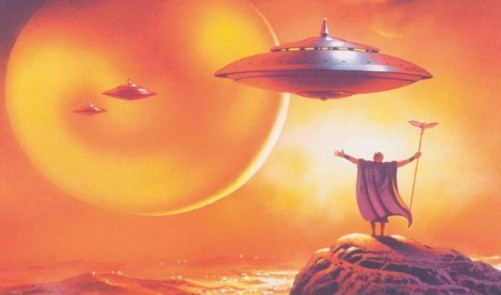When we discover intelligent life in the universe we will have to face certain facts. The first would be that the appearance of an intelligent humankind was not a special act of creation by god(s). If intelligent life can arise in a multitude of conditions it makes it less arguable that God needed to act specially in order to create humankind. Yet such actions are part of the creation stories of all major religions. The particulars of our religions would be reduced to local symbolism and relative truths that apply only in some parts of the Universe, to some species.
If one group of sentient beings on Planet A have to abide by a religious book that was sent their way by a divine messenger, and sentient beings on Planet B have a different book, in a different language, with completely different stories of creation, sin and redemption, then how do adherents on either planet claim that their religion is the ultimate truth? It can't be the ultimate truth. It is only localized, temporary, limited truth, which applied only to one species, for the duration of their existence. I am sure that just like all human religions, part of the lore includes masses culture-specific, language-specific and time-specific texts that lose meaning over distance and time. If those two vastly different cultures meet on Planet C, then, by which ultimate truth would the future natives have to abide by? Clearly, new religions would be needed to cope with these complexities.
Imagine an intelligent race in the universe finding out what our religion says about us and our central position in the Creator's plan, and perhaps imagine trying to tell them that our religions are not born from our own imagination, pride and ego. Needless to say, we would embarrass ourselves.
2. Saviour Religions Will be Challenged
The impact of extra-terrestrial life on theology is a lot more interesting than outsiders would presume. The existence of aliens therefore throws a long shadow of doubt over the entire Christian system of sin and redemption, Heaven and hell, and in particular, cause problems for the idea of an only-son-of-god saviour. Judaism, Christianity and Islam all have holy books that claim to be absolute truth, yet, their cosmology places humankind and the Earth in a special, unique position in Gods plan especially with regards to the causes and solutions to suffering. When we find aliens and discover their religions, if they have them, our traditional religions will no longer make much sense.
In Christianity the Creator of the Universe has only one son, and that one son was born on Earth in the form of a Human, and died there in order to save humans. Such a sacrifice only occurred once, not once per planet, once per intelligent species, or even once per galaxy. There is no saviour for anyone who is not on Earth.
Is it amazing divine grace that us Humans are so blessed with the Creators special and ultimate attention? Or is it an anachronism, written into our myths and religions during a time when Humanity did not yet perceive the vastness of the Universe? Given that Christianity fought major battles with astronomers about the Earth being the center of the world and with biologists about evolution, and lost both major battles, I would hazard a guess that when it comes to the uniqueness of the Human race in the Universe, Christianity also finds itself the wrong side of the divide between mythology and history.
The Christian conception of God, sin and salvation, and of the son of God, Jesus Christ, is steeped in egotistical and prideful homocentricity.
3. There are Already Some Alien-Centered Religions, and Universalist Religions Cope Quite Well With ETI
Mainstream theologians and intellectuals within the Abrahamic suite of religion have not given much time to discussions of the implications of alien life. However some have, and Erman McMullin warns his fellows that "religion which is unable to find a place for extraterrestrial persons in its view of the relations between God and the universe could find it increasingly difficult to command man's assent in times to come".
Some saviour religions actually cater for aliens. The Urantia movement holds that God has 700 000 sons incarnated on various worlds in the universe; Jesus is, of course, one of those divine sons6. The early scientist and astronomer Huygens argued that "the planets must be inhabited because otherwise God had made worlds for nothing". The religions that seem best placed to function in a Universe with more than species of intelligent, sentient beings are those that hold to universalist ideals; that is - the creator of the universe saves all living beings, and everyone goes to heaven. Other positions - that God punishes members of one species for doing 'evil' things, while punishing members of a different species for doing completely different things according to local circumstances, does not make sense if God embodies any set of absolute morality. In other words - deist, pantheist, universalist and non-religious forms of deism appear to be able to explain aliens much better than Abrahamic religions (Judaism, Christianity and Islam).
There are some non-traditional religions that are perfectly happy with the existence of alien intelligent life. These tend to be atheistic religions. For example many UFO cults are atheistic. The infamous Scientology is a sci-fi, self-help, anti-alien religion with beliefs that don't include any kind of theism (hence, it is also atheist).
The Raelians in particular gained fame as the quintessential UFO-based religion. The actions of their "Clonaid" organisation, founded in 1997, was a veiled attempt at drawing people into their movement. It all started in The Bahamas when Claude Vorilhon claimed that in 1973, aliens approached him and told him that humans were created 25,000 years ago by advanced aliens in a laboratory. Luckily for Vorilhon they spoke fluent French and they knew the Bible very well, and informed us all that we'd mistranslated it quite badly. He had previously been a pop singer and racing-car journalist and it is somewhat a mystery as to how, inbetween 1973 and 1997, he managed to live a normal life with such a monumentous event behind him. Some people suspect he made the whole thing up.

1. Can Species-Specific Religions Claim to Embody Ultimate Truth?




